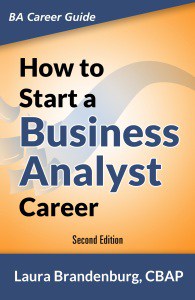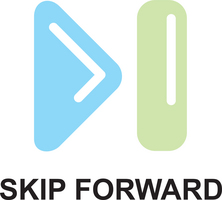If you are an experienced professional, let’s face it, the idea of starting a job that is “entry-level” or with the title of “junior” is not very appealing. Not to mention the salary cut you’d likely have to take. All those years of experience have to be worth something, right? If you are going to be a business analyst, do you have to throw away all your hard-earned professional credibility?
In business analysis, your experience counts. Big time.
Of course, not all experience counts. If you’ve been pumping gas on a boat dock or waiting tables (I’ve done both), you won’t have a lot of relevant experience to draw from. (Though Adrian Reed made the case that your customer service skills will be an asset in your business analysis career.) I’ve also seen professionals from technical support, training, sales, recruiting, and accounting identify relevant experience. And I’m sure I could eek some relevant professional experience out of tutoring elementary school students, working the library reference desk, and even my role as an assistant editor at a large publishing company.
And then there are roles that just plain include business analysis responsibilities. For example, I re-framed a part of my experience as a Quality Assurance Engineer and Systems Analyst as part of the qualifying hours I documented for the CBAP exam. I’ve also seen individuals from the technical writing, project management, general management, consulting, and software engineering professions skip right into full-fledged business analyst roles and do really well.
The short story is, if you can pull together a mix of related experiences (aka transferable skills) from amongst several professional roles related to business analysis, you might just have the makings of a tried and true business analyst.
Not “junior.”
Not “entry-level.”
Just “Business Analyst.”
You might be thinking that this is just another strategy that happens to work for some professionals, especially those professionals that have more experience than you or who aren’t quite so new to the profession. The thing is, that it’s actually the most common path to business analysis I see work, at all, even for professionals who start out thinking that they don’t have much relevant experience to draw from.
Let’s look at a few examples.
Joan Davis shared her story of transitioning from the HR department to an IT intern. After applying to many internal jobs unsuccessfully, she decided on a different approach.
Eventually I had a heart-to-heart with the IT Department Head, recapping my assets as someone who was capable of comparable work plus knowledgeable of the business side, someone that might soon be lost to a competitor given no other choice. Read the entire post.
As Michelle Swoboda advised one of our readers, based on her own experience in overcoming a tough local job market:
All your skills are transferable and you can translate your resume into the career that you are passionate about – just find out what that is! It is well worth the time and energy. Read the entire post.
Even recent college grads can make use of this strategy. Eric used professional experienced he gained in his first year out of college to position himself as more experienced and therefore ready for the BA role.
I identified the skills and experiences in my background that would be relevant to a BA role and rewrote my resume so that it would reflect those skills and experiences. I then targeted BA (or similar) positions that didn’t require more than 2 to 3 years of work experience. Although I only had only 7 months of work experience out of college, I was able to persuade my interviewers that I was more than capable of performing the job. I actually ended up with two offers for BA positions. Read the entire post.
Your skills are relevant and valuable and could help you secure a business analyst position that’s well-beyond the entry-level designation. But first you must discover what those skills are and be confident in how your experience is relevant.
Click here to read an article about how to discover your transferable skills
>> Find Your Path Into Business Analysis

This book will help you find your best path forward into a business analyst career. More than that, you will know exactly what to do next to expand your business analysis opportunities.
Click here to learn more about How to Start a Business Analyst Career


Hi Laura,
Thank you so much for your suggestion. I will definitely consider it!
Maria
Laura,
Thanks for another good post! One factor that eases the transition of a experienced professional to a non-entry-level business analyst position is the set of soft skills this role relies on. People skills, negotiation, a well established relationships network are examples of characteristics that are more commonly found in people with a certain time of career.
Eduardo, I would agree, soft skills are very transferable!
Hi Laura,
I just want to say thank you so much for this blog! Ever since I decided I want to pursue a BA role, your blog has been primary source.
My background is quite different as I am not much of an IT person but much more close to retail business operations. While in college or when I volunteered I managed projects, groups, facilitated meetings and planned events. My main thought was always how do I reach goal by making things easier on the way? As I continue to research more about becoming a BA, I realize my past experiences really fit my natural strengths and most importantly what I love to do. I currently am holding a entry level position at a retail company desire to move toward BA role. I would love to continue this discussion with someone with your experience. I can’t wait to hear from you!
Maria,
Thank you so much for your positive feedback! Many, many professionals have started careers in business analysis without being IT people, so you are in good company. Facilitating meetings, managing groups and planning events sounds like great experiences from which to mine transferable skills that will be valuable as part of a career change to business analysis.
I’ll be in touch with options for working with me directly.